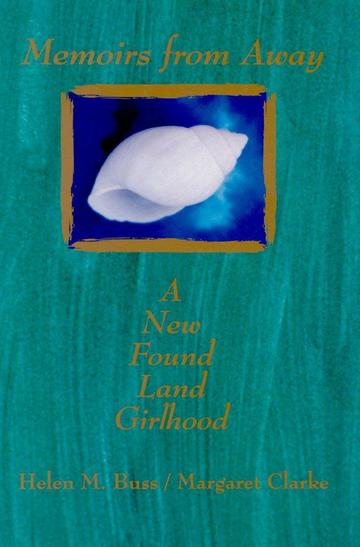How does the imagination entwine the shreds of memory of family, place and culture to root a self in the fluid experience of the present?
Daughter, wife, mother, teacher, writer and feminist academic, Helen M. Buss / Margaret Clarke has lived in many parts of Canada and writes from a life of multiple perspectives full of contradictory loyalties and obligations, of opposing histories and identities. For this woman, whose sense of a unified identity is so tenuous that she even writes under two names, writing memoirs becomes the way to bring together the diverse strands of her life.
A Newfoundland girl who awakened to the public world just at the moment her homeland joined Canada, she writes of her childhood, of the effects of war, technology, the politics of nation and gender, and of the private world of several generations of her close-knit family. From the perspective of a woman from “away”, she discovers a New Found Land of “girlhood” that weaves past and present in a narrative that delights in questioning its own making.
Helen M. Buss is a professor of English at the University of Calgary. Her book on Canadian women's life writing, Mapping Our Selves, won the Gabrielle Roy Prize. As Margaret Clarke, she has published novels, short stories and poetry. Three of her most recent books published by Wilfrid Laurier University Press are Memoirs from Away: A New Found Land Girlhood, Mary Wollstonecraft and Mary Shelley: Writing Lives, edited with D.L. Macdonald and Anne McWhir, and Working in Women’s Archives edited with Marlene Kadar.
''Helen Buss's memoirs of her childhood in Newfoundland is as much an exploration of the process of memoir as it is an unflinching recollection of the past....The doublevoiced narrator -- Buss and Margaret Clarke, her pseudonym -- everywhere reminds us that memoir is a construction of words as slippery as seaweed. Stories are retold with crucial shifts of emphasis. Versions are coldly analyzed and pronounced to be all or partly lies. Language is viewed askance as a potential betrayer. Yet language is all there is: the axe poised to take revenge against neighbourhood boys must be 'honed into words.' And later, the feminist must subvert the patriarchal construction of gender by rewording. The urgency of this transformation of life into language is the heart and soul of this engaging memoir.''
This book concentrates on the author's childhood in the forties and early fifties before her family left Newfoundland for Western Canada. Nor is the narratice simply chronological. Buss (Margaret Clarke is her alter ego, the name she uses when writing fiction) selects incidents which illustrate--one could even say 'symbolize'--the points she wishes to make. These incidents, in turn, are linked backward and forward with her ancestors, her parents and siblings, and her husband and children. The result is as intricately woven as a nest. And, by clearly showing her experiences are typical of those of the generation of Canadian women now in their 50s, the author helps us understand our own lives better. Both of which deserve to be widely read.
''This book concentrates on the author's childhood in the forties and early fifties before her family left Newfoundland for Western Canada. Nor is the narratice simply chronological. Buss (Margaret Clarke is her alter ego, the name she uses when writing fiction) selects incidents which illustrate--one could even say 'symbolize'--the points she wishes to make. These incidents, in turn, are linked backward and forward with her ancestors, her parents and siblings, and her husband and children. The result is as intricately woven as a nest. And, by clearly showing her experiences are typical of those of the generation of Canadian women now in their 50s, the author helps us understand our own lives better. Both of which deserve to be widely read.''
Helen Buss's memoirs of her childhood in Newfoundland is as much an exploration of the process of memoir as it is an unflinching recollection of the past....The doublevoiced narrator -- Buss and Margaret Clarke, her pseudonym -- everywhere reminds us that memoir is a construction of words as slippery as seaweed. Stories are retold with crucial shifts of emphasis. Versions are coldly analyzed and pronounced to be all or partly lies. Language is viewed askance as a potential betrayer. Yet language is all there is: the axe poised to take revenge against neighbourhood boys must be 'honed into words.' And later, the feminist must subvert the patriarchal construction of gender by rewording. The urgency of this transformation of life into language is the heart and soul of this engaging memoir.
What makes Buss/Clarke's work stand out is her innate attention to detail. Not only does she describe personal family history within the political and historical context of her former home, she provides intimate and physical glimpses into her sometimes painful past, which in every sense paved her future.... And educators, especially those interested in the history of education in Newfoundland, will delve again and again into the author's final chapters. The quotations taken directly from history and science textbooks of the 1950s in Newfoundland's elementary school curriculum are fascinating and Buss/Clarke explores how such conservative texts shaped and influenced her perception of herself as a child and as a woman in a world dominated by men and the work of men.... Memoirs from Away is more than just a memoir. It reads like a novel, and it engages readers to think beyond the author's life and to think of their own. Here is one woman's quest for truth--for herself, for women, for womanhood. Perhaps Helen Buss/Margaret Clarke's Memoirs from Away will influence others to delve deeper and welcome such a journey for truth.



